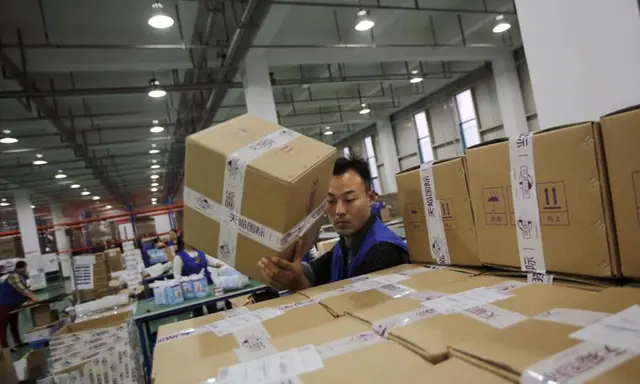Alibaba Group Holding says the introduction of the Singles’ Day shopping extravaganza and the Tmall.hk platform to Hong Kong is an important first step in its push to ramp up services outside the mainland.
Daniel Zhang Yong, the chief executive with the e-commerce behemoth, said the Tmall online marketplace could help make up for Hong Kong’s relatively few hypermarkets.
“We want to offer a large variety of daily necessities to the city’s customers with the help of our partner, American warehouse club retailer Costco,” Zhang said at the launch of Alibaba’s 2016 11.11 Global Shopping Festival in Hong Kong Thursday.
Costco is a US retailer rivalling Wal-Mart, which is known for delivering bulk goods at low prices.
Alibaba also unveiled Tmall.hk, which allows for payment by credit cards and Octopus cards and transactions in Hong Kong dollars.
The event kicked off Alibaba’s flurry of marketing activities ahead of the Singles’ Day shopping spree, an annual event held on November 11 that will see billions of dollars of goods transacted on its e-commerce platforms within 24 hours, making it the world’s biggest online shopping event.
Known as China’s Cyber Monday, it is also seen by some analysts as an indicator of the internet titan’s business well-being. Last year, the site saw sales hit a record 91 billion yuan (HK$104.8 billion), an increase of 60 per cent from a year earlier.
Alibaba said the festival’s arrival in Hong Kong was also intended to “test the waters” for its global expansion that might one day compete head to head against US rival Amazon.
“This is our first step and we will never backtrack,” Zhang said. “It takes some time to educate and get shoppers in the city familiar with our channels and platforms, but I believe this time frame will definitely be shorter than five to 10 years.”
Alibaba is also looking towards Southeast Asia, reflected by its US$1 billion acquisition of Singaporean e-commerce firm Lazada Group, which also operates sites in Indonesia and Malaysia.
“For Lazada, we are helping it transfer its business model from a self-operative business, which is similar to JD.com, to a Tmall-like platform, where individual companies operate their own brands,” said Chris Tung, the chief marketing officer of Alibaba. Luxury brands such as Burberry, Guerlain and Maserati will also take part in the Singles’ Day shopping extravaganza this year.
In another twist, Alibaba will enable mainland customers to use virtual reality during the 11.11 Festival.
During the 11-day lead-up to the event, mainland shoppers can browse products in virtual reality at participating merchants in the US, Australia and Japan.
“The technology applies to an extremely limited set of products at Tmall now,” Tung said. “We do not expect the technology to contribute much to our sales during this festival, but it will provide a new shopping experience for customers.”
About 150,000 virtual-reality cardboards will be available for one yuan each on Taobao from Friday, but they are only reserved for the site’s senior VIP members on the mainland.
“I am not sure the virtual-reality stores will be maintained after the festival. It depends on consumers’ feedback,” Tung said. “But the virtual-reality technology at Alibaba is mature enough to be applied to the entire shopping process, from product selection through to payment.”
Augmented reality will also be featured for the first time at the festival. Alibaba will release a location-based augmented-reality mobile-phone game about two weeks before November 11. Consumers can follow the Tmall cat mascot to earn special promotions and prizes.
(SOUTH CHINA MORNING POST)
 简体中文
简体中文



